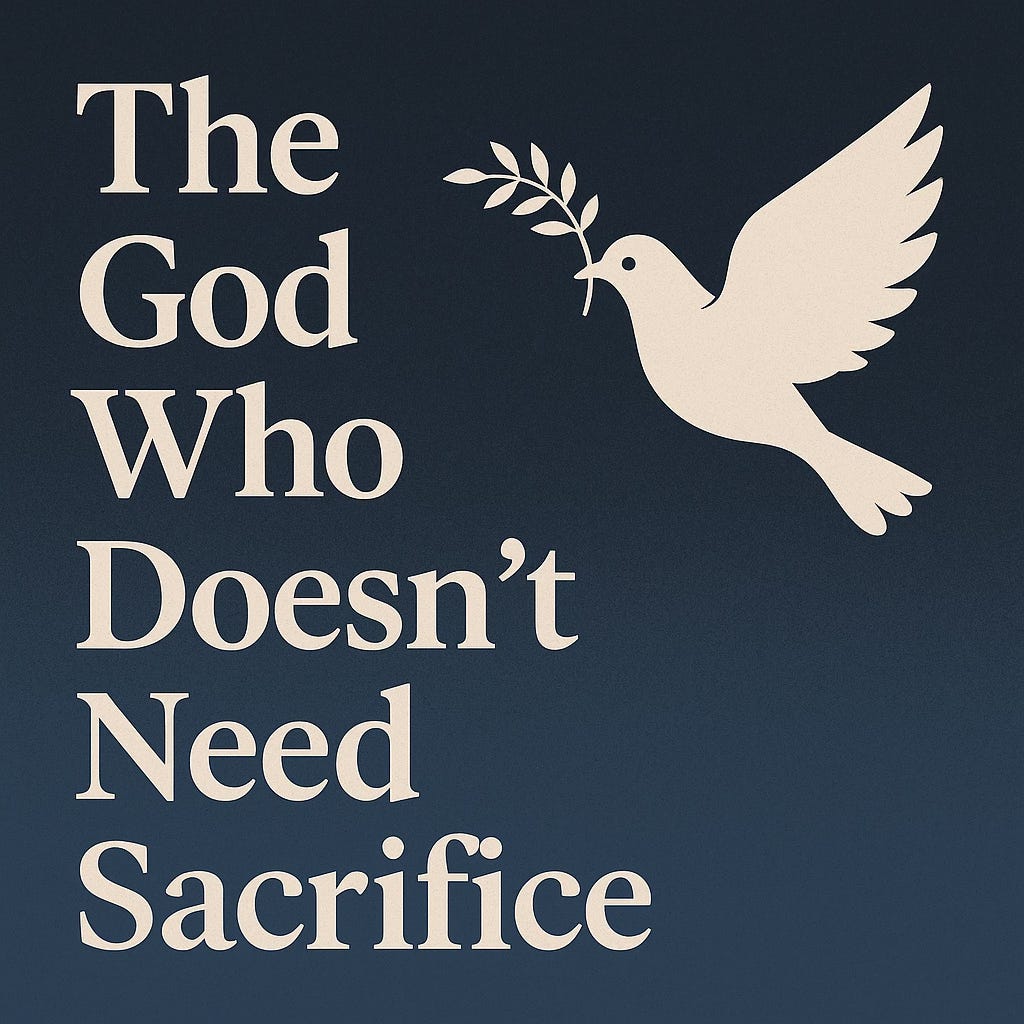If your God demands blood to love you—
if He can’t forgive without violence—
what kind of God is that?
This isn’t just theological.
It’s political.
It’s emotional.
It’s the foundation of how systems justify suffering—
and how people learn to call cruelty “divine.”
Christian Nationalism clings to a God who must be appeased.
A God who can’t tolerate disobedience.
A God who needs suffering to prove you’re serious.
But what if that’s not what Jesus came to show us?
1. The Blood-Thirsty God: Where Did He Come From?
This version of God isn’t the only one in the Bible—
but it’s the one that authoritarians prefer.
It’s a God who:
demands sacrifice
punishes the innocent
requires substitutionary atonement
sees blood as the price of reconciliation
It’s the God who “had to kill Jesus” to forgive us.
This idea became dominant in many branches of Christianity,
especially after the rise of empire-aligned churches.
And it gave religious leaders exactly what they needed:
a divine mandate for violence, obedience, and punishment.
If God demands blood to stay holy,
then how can we question wars, prisons, executions, or exclusion?
If sacrifice is how love is proven,
then abuse becomes sacred.
2. Why This God Works for Authoritarians
A God who demands sacrifice is perfect for authoritarian leaders.
Because that kind of God:
Doesn’t tolerate questions
Requires obedience over understanding
Punishes instead of restores
Rewards loyalty over compassion
And the people who follow Him?
They’re primed to do the same.
If God can only love through violence,
then violence becomes virtue.
If you’ve been taught your whole life that someone has to suffer—
then when it’s your turn to hold power,
you just decide who suffers next.
This is why authoritarian leaders love this God:
He justifies cruelty in the name of holiness.
He equates punishment with protection.
He makes obedience more important than empathy.
And He demands fear—not love—as the foundation of relationship.
This God teaches people that control is care.
That pain is proof.
That submission is salvation.
And that’s how Christian Nationalism turns its theology into policy.
By dressing domination in scripture.
This isn’t divine love.
It’s cosmic abuse—codified and canonized.
🩸 3. What If God Never Needed Blood?
If God never needed sacrifice to be just—
if love didn’t require suffering—
then the entire theology of control collapses.
And maybe that’s why they fight so hard to keep it.
We can see this playing out in real time:
Every month this year, when we should be celebrating human dignity—
during Black History Month, Women’s History Month, Pride Month—
the Christian Nationalist agenda has responded with cruelty.
DEI programs defunded
Food and healthcare access slashed
Research grants and legal protections revoked
Visibility criminalized, books banned, identities erased
All to send a clear message:
Your worth is conditional.
Your safety is not guaranteed.
Your flourishing is not allowed.
And behind that policy is theology:
You must suffer.
You must repent.
You must conform.
Not because the state demands it.
But because God allegedly does.
But that’s not the only God in scripture.
There is also a God who says:
“I desire mercy, not sacrifice.”
“Let justice roll down like waters.”
“Blessed are the peacemakers.”
A God who heals instead of harms.
A God who breaks bread, not bodies.
A God who touches the untouchable,
restores the outcast,
and calls the poor—not the powerful—blessed.
This isn’t the God of Christian Nationalism.
It’s the God they fear.
Because this God doesn’t need their systems of domination.
He overturns their temples.
He dines with their enemies.
He exposes their fear of losing control.
🕊 4. A God Who Heals Instead of Hurts
This is the God I believe in now.
Not the one who demands suffering to be satisfied—
but the one who sees suffering and ends it.
Not the one who waits for blood,
but the one who bleeds with us.
And builds something new from the pain.
The God who touched lepers.
The God who forgave his murderers.
The God who fed people without checking their doctrine.
If that God is real,
then everything changes.
We don’t need leaders who punish.
We don’t need systems that withhold.
We don’t need to prove we’re worthy to be loved.
We just need to build what He started:
A kingdom where healing is policy,
mercy is infrastructure,
and no one has to die to be seen as divine.
But that terrifies those who cling to control.
Because this God doesn’t need their rules.
He doesn’t need their rituals.
He doesn’t need their power.
He needs us—to see that we were never meant to be sacrifices.
We were always meant to be witnesses.
To a different kind of love.
A different kind of justice.
A different kind of kingdom.
The day I stopped believing that pain was proof of love—
was the day I began to heal.
That’s when I found a God who didn’t need my sacrifice.
He just needed my honesty.
My humanity.
My heart.
And maybe that’s the God worth resisting for.
NEXT - A Theology of Inequality




